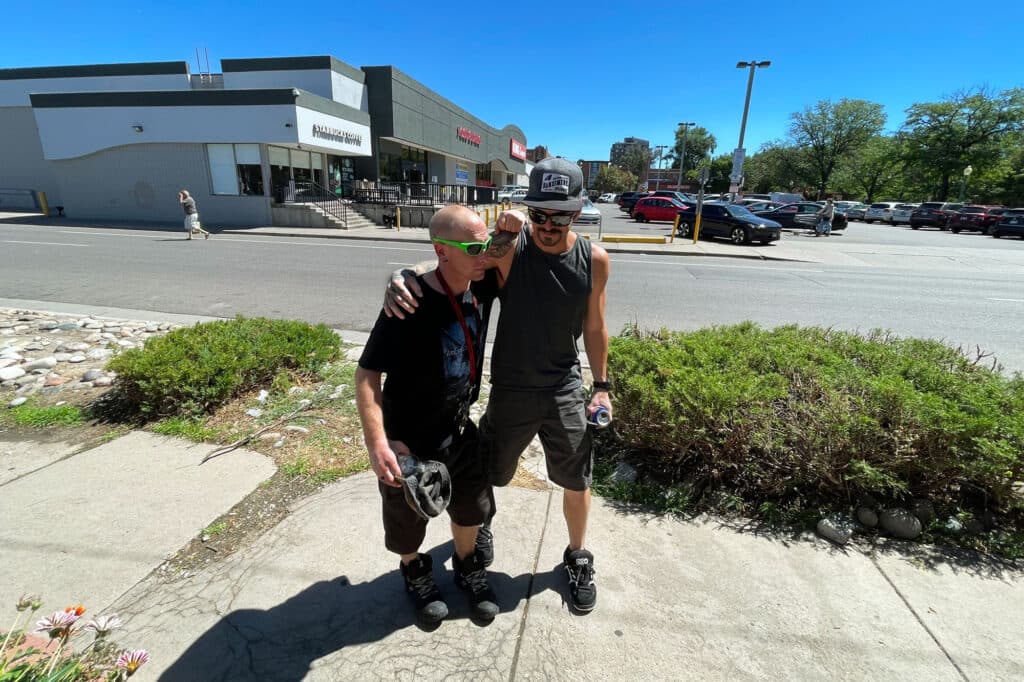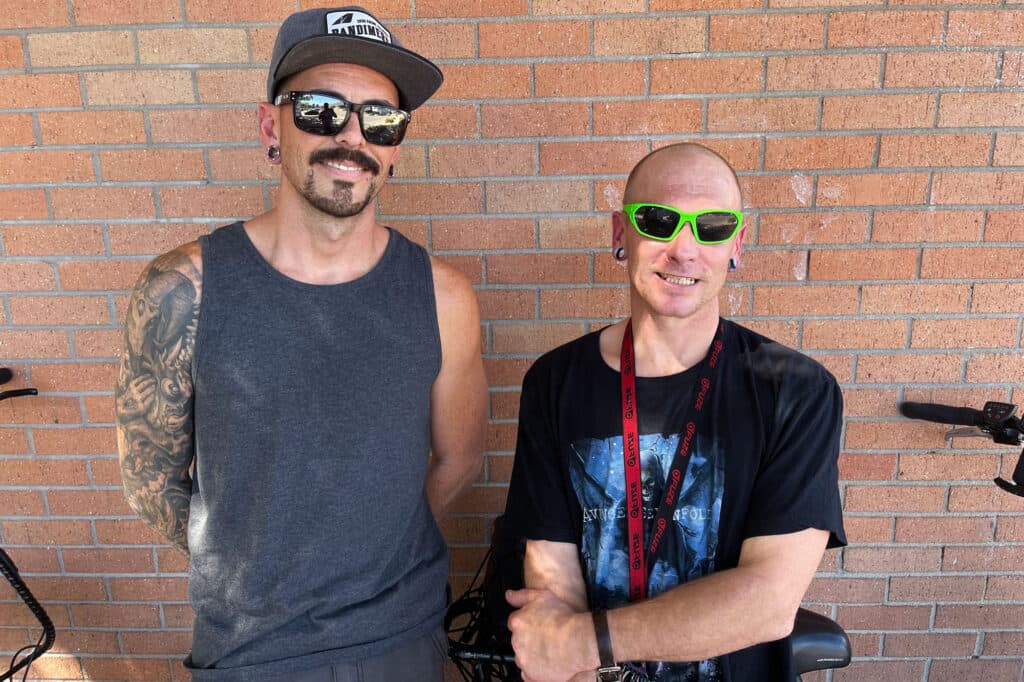Michael Webb and James Peters, best friends since third grade, sit on their e-bikes and lean against the brick wall of an empty store.
They stare angrily at the King Soopers on Capitol Hill, where they say they were simply kicked out by the employees.
“I’m too depressed to talk,” says Peters.
The whole ordeal began at 6:07 a.m. the day before, a Monday. Peters had put all of his change—all the money he had in the world—into the store’s Coinstar machine.
The machine printed a receipt, which he took to the cashier to collect his $111.
“But it was 6:07 a.m. and the vouchers aren’t redeemed until 8 a.m.,” says Peters.
He had a court date in Aurora that morning, so he left the store and returned with Webb on Tuesday. But when they arrived, an employee explained that they were late. They should have come back on Monday – receipts must be cashed the day they are printed.
The men felt that the store was robbing them of $111 that they desperately needed and that there was nothing they could do about it.
Peters lost his temper and the store employees finally threw him out.
Store staff declined to comment for this article.
“They robbed my brother,” says Webb, who called Coinstar on behalf of his friend. “I was on hold forever, but when they answered, this super nice woman gave me a code and made sure the transaction was correct.”
Since Peters had been chased out of the store, Webb went into King Soopers with the receipt and code. Six people, he says, surrounded him to throw him out. He ignored them and went to the cash register.
“The poor man who worked there just thought, ‘Oh my God, that guy’s back,'” Webb says. “But I gave him the code and we got the money.”
The $111 was back in her hands. To her, it was a fortune. And at the same time, it was so little.
“How can that be all the money I have in the world?” Peters asks himself.
Not long ago, Peters was thriving. Now he’s crashed.
Peters is a master tiler and owner of Trinity Tiling. He has been doing custom tiling work for Denver homeowners for 19 years.
As the owner of his own business, he earned more money than he needed.
“Two or three years ago I rented a house in Aurora on the Southshore – $3,300 a month,” he says. “And that was a piece of cake for me at the time – so easy. I had $10,000 for the first and last month’s rent and a security deposit. I lived like a ballermann, as they would say, and now I’m at rock bottom.”
When he had the money, he spent it excessively. Then he separated from his wife. The pandemic and inflation disrupted the construction industry. Customers stopped calling to lay tile work.
Nowadays his business barely earns a cent.
“My bill is $125, and I can barely afford to live in my parents’ basement for free,” Peters says.
His things are locked in a storage room. A rodent has free rein there.

“It’s eating through the golf club bags and eating the seat of my dirt bikes and my boots for my wakeboards and bindings and snowboard boots,” Peters says. “It’s just ruined everything.”
He pays $400 a month for this type of storage space – a bill he has not been able to afford until now.
“I’m so broke right now because I haven’t had a job,” Peters says. “I can’t even get into my storage unit right now. So it’s like all my stuff is in God’s hands – that I get money before the first of next month. Is all my stuff gone then? Or am I going to live one more day to die with this deal?”
Over the years he struggled with drug and alcohol addiction and recently relapsed after five years of abstinence.
“I don’t even eat anymore,” he says. “I don’t exercise anymore. I don’t do anything. I’m literally giving up on life. It was that bad. I’m still alive, unfortunately, but the other day I almost accomplished my mission by overdosing. But my baby’s mommy called 911 and they came and got me and took me to the hospital.”
For the third time in his life, he abruptly stopped taking fentanyl and lay alone in his bed, sweating and suffering.
He has been sober for a week.
“I’m glad you’re here,” Webb says. “I don’t have anyone else.”
Webb also struggled with his addiction, but his living situation has improved.
When he was 12 years old, he says, he accidentally burned down a post office.
“It pretty much ruined my life from the start,” he says. “Drugs and alcohol came very soon after.”
He has lived all over Colorado, from Parker to Castle Rock to Loveland to Fort Collins, but Denver felt most at home to him and he has wanted to live downtown his entire life.
“I always wanted to live downtown until I became homeless there, and I didn’t want to live down here,” he says.
By the time he was 25, he was living outdoors under a canopy at the Althea Center for Engaged Spirituality, a church at 13th Avenue and Williams Street.
During the day, he would hide his belongings in a nearby bush while he worked at Ready Labor as a construction cleaner for $50 a day. At night, he would drink at Satire. Then he would go back to the church to sleep, hoping his things would still be there. Often, they weren’t.
- Homelessness has increased in Denver, but fewer people are sleeping outdoors than last year
Now, at 38, he’s finally getting his life back on track. He’s been through several stints in poor rehab facilities. He relapsed and suffered withdrawal symptoms that led to brutal seizures. He found some stability in the Denver Rescue Mission’s New Life Program, where he stayed sober, held down a job, and finally earned a car after graduating.
And recently he spent nine months living in a shelter, sleeping in a heated tent with a refrigerator. Sure, he was still homeless, but at least he managed to find some level of stability.
Thanks to government subsidies, he was able to afford a RadPower e-bike. Fed up of driving, he sold his car and started driving around town. Then he crashed into a fire hydrant at 30 km/h and broke his leg – a tibial plateau fracture. He had 50 staples in his leg and was confined to a wheelchair.
In the spring, Webb contacted a volunteer at the Saint Francis Center, who helped him find a studio in the Colburn Hotel and Apartments, the building above the classic Denver pub Charlie Brown’s.
For the first time in his adult life, Webb is living near downtown, in a house in Capitol Hill. Peters moved his belongings in for him. Webb needed crutches to get to his fourth-floor apartment. Without Peters, he doesn’t know how he would have managed the move.
“Man, he did a lot for me,” Webb says. “If I didn’t have him, I wouldn’t be here. I’d be gone. Not gone from Denver, gone from the world. It’s good to have a friend, a brother.”
Webb says there are programs in Denver that have helped him along the way.
“When I first became homeless at age 25, I did a lot of research and research into resources,” Webb says.
Many homeless people have to go without food, and in his opinion this is completely unnecessary.
“There are all kinds of places where food and things like that are distributed,” he says.
- Aurora has displaced hundreds from an apartment building. We followed a mother of three as she considered what to do next
Medicaid saved him when he needed treatment for alcoholism and when he broke his leg while riding his bike.
“If you’re homeless, you can get Medicaid,” Webb says. “And Medicaid is the best insurance you can have. I had Medicaid. It saved my ass several times when I was an alcoholic. I was in treatment centers. Medicaid saved my ass with medical stuff.”
Webb says investing in his health is ultimately good for society.
“I’ve worked a lot over the years,” he says. “I feel like I’ve worked enough to feel like I’m not ripping off the taxpayers. I pay taxes every year, so I’m damn grateful for that… Denver has been pretty awful, but honestly pretty good to me. So, when you get down to it, Denver has been wonderful to me. I mean, I’m glad I’m where I’m at.”
But Medicaid didn’t work for Peters. His previous income excluded him from health insurance.
Peters broke his leg in a motorcycle accident five years ago.
It took him a year to walk with his broken leg before he finally sought treatment.
The doctors asked him: “How did you do that?”
“Drugs,” he replied.
He felt he had no other choice and said he could not afford “million dollars in medical debt.”
“You have to do what you have to do,” says Webb.

“I have two infected teeth,” says Peters. “And I can’t get health insurance because of my tax debts from previous years.”
He reaches into the pocket of his cargo shorts, searching for his Orajel, and realizes it’s missing. He can barely open his mouth.
“This guy has worked hard his whole life,” Webb says. “He’s the hardest worker… It sucks. His teeth are breaking and he can’t get them fixed right now. There’s something wrong here. It’s hard to stay happy. It’s hard to smile all the time. It’s hard to be nice.”
But it’s important to both men to be nice, something that’s become increasingly rare in Denver since the pandemic.
As they talk about how tense the situation in the city is becoming, a man at a bus stop down the street yells at a woman in her car, angry because she is blocking a bus that is nowhere in sight.
Although Peters admits that the woman parked incorrectly, he is appalled by the man’s behavior.
“Everyone deserves the benefit of the doubt,” Peters says. “Be kind, too. They don’t know what they’re going through. They could be going through something 10 times worse than what you’re going through. They could have lost a parent this week and one last week. You don’t know. Be kind. Not everyone has to be so nervous.”
Peters is strong. He knows how to defend himself and has rescued Webb from the situations that people with addiction problems all too often find themselves in.
But today Peters avoids confrontation. Even with the King Soopers employees who refused to pay them, he and Webb helped each other stay grounded, he says. They tried to keep their cool as best they could, even when they felt betrayed.
“Everyone looks at you like you want to fight,” Peters says. “It’s like, ‘I have no interest in fighting. I want to buy my daughter doughnuts and go home.'”

